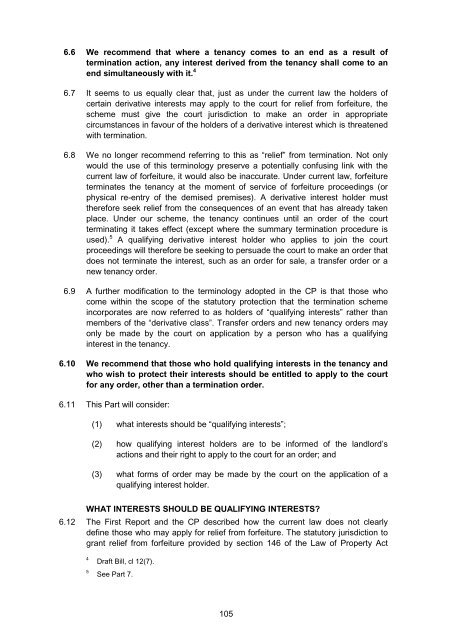Termination of Tenancies for Tenant Default - Law Commission
Termination of Tenancies for Tenant Default - Law Commission
Termination of Tenancies for Tenant Default - Law Commission
You also want an ePaper? Increase the reach of your titles
YUMPU automatically turns print PDFs into web optimized ePapers that Google loves.
6.6 We recommend that where a tenancy comes to an end as a result <strong>of</strong><br />
termination action, any interest derived from the tenancy shall come to an<br />
end simultaneously with it. 4<br />
6.7 It seems to us equally clear that, just as under the current law the holders <strong>of</strong><br />
certain derivative interests may apply to the court <strong>for</strong> relief from <strong>for</strong>feiture, the<br />
scheme must give the court jurisdiction to make an order in appropriate<br />
circumstances in favour <strong>of</strong> the holders <strong>of</strong> a derivative interest which is threatened<br />
with termination.<br />
6.8 We no longer recommend referring to this as “relief” from termination. Not only<br />
would the use <strong>of</strong> this terminology preserve a potentially confusing link with the<br />
current law <strong>of</strong> <strong>for</strong>feiture, it would also be inaccurate. Under current law, <strong>for</strong>feiture<br />
terminates the tenancy at the moment <strong>of</strong> service <strong>of</strong> <strong>for</strong>feiture proceedings (or<br />
physical re-entry <strong>of</strong> the demised premises). A derivative interest holder must<br />
there<strong>for</strong>e seek relief from the consequences <strong>of</strong> an event that has already taken<br />
place. Under our scheme, the tenancy continues until an order <strong>of</strong> the court<br />
terminating it takes effect (except where the summary termination procedure is<br />
used). 5 A qualifying derivative interest holder who applies to join the court<br />
proceedings will there<strong>for</strong>e be seeking to persuade the court to make an order that<br />
does not terminate the interest, such as an order <strong>for</strong> sale, a transfer order or a<br />
new tenancy order.<br />
6.9 A further modification to the terminology adopted in the CP is that those who<br />
come within the scope <strong>of</strong> the statutory protection that the termination scheme<br />
incorporates are now referred to as holders <strong>of</strong> “qualifying interests” rather than<br />
members <strong>of</strong> the “derivative class”. Transfer orders and new tenancy orders may<br />
only be made by the court on application by a person who has a qualifying<br />
interest in the tenancy.<br />
6.10 We recommend that those who hold qualifying interests in the tenancy and<br />
who wish to protect their interests should be entitled to apply to the court<br />
<strong>for</strong> any order, other than a termination order.<br />
6.11 This Part will consider:<br />
(1) what interests should be “qualifying interests”;<br />
(2) how qualifying interest holders are to be in<strong>for</strong>med <strong>of</strong> the landlord’s<br />
actions and their right to apply to the court <strong>for</strong> an order; and<br />
(3) what <strong>for</strong>ms <strong>of</strong> order may be made by the court on the application <strong>of</strong> a<br />
qualifying interest holder.<br />
WHAT INTERESTS SHOULD BE QUALIFYING INTERESTS?<br />
6.12 The First Report and the CP described how the current law does not clearly<br />
define those who may apply <strong>for</strong> relief from <strong>for</strong>feiture. The statutory jurisdiction to<br />
grant relief from <strong>for</strong>feiture provided by section 146 <strong>of</strong> the <strong>Law</strong> <strong>of</strong> Property Act<br />
4 Draft Bill, cl 12(7).<br />
5 See Part 7.<br />
105

















